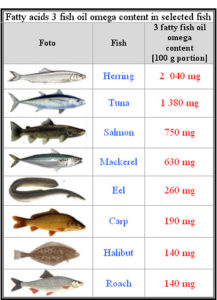
Humans can make most kinds of fats they need from raw materials or other fats. But, that is not the case for omega-3 fatty acids, also known as n-3 fats and omega-3 fats. These are very essential fats – the human body cannot make them from scratch, but must obtain them from food. Foods very high in Omega-3 include nuts (particularly walnuts), fish, vegetable oils, leaf vegetables, flax seeds and flax seed oil.
What really makes omega-3 fatty acids special? They are a vital part of the cell membranes all throughout the body. Omega 3 fatty acids influence the cell receptors’ function in these membranes, and provide the foundation for producing hormones that regulate blood clotting, inflammation, as well as contraction and relaxation of artery walls.
Omega-3 also binds to cell receptors that control genetic function. Because of these effects, they have been shown to help curb stroke and heart disease, may help control eczema, lupus, and rheumatoid arthritis. Also, omega 3 fats may play protective roles in different conditions such as cancer.
Omega 3 fats are necessary for the health; unfortunately, the human body cannot manufacture them. You can find them in fish like tuna, halibut and salmon, other sea foods including krill and krill and algae. Omega 3 fats are also known as polyunsaturated fatty acids or PUFAs. These play important roles in normal growth and development.
They have become famous because they may lower the risk of heart disease. It is recommended by the American Heart Association or AHA to eat fish particularly, fatty fish like herring, salmon, mackerel, albacore tuna, and lake trout at least twice a week.
A recent study shows that omega 3 fats are highly concentrated in the brain and it appears to be significant for cognitive and behavioural function. Actually, infants who lack omega 3 fats from their moms during pregnancy are at risk for developing nerve and vision problems. Symptoms of such deficiency include poor memory, heart problems, poor circulation, fatigue and dry skin.

It is very important for everyone to have the right ratio of omega 3 and omega 6, which is another important fatty acid in the diet. Omega 3 fats help minimize inflammation, and most omega 6 fats be likely to promote inflammation.
The usual American diet contains approximately 14 to 25 times more omega 6 than omega 3, which lots of nutritionally-oriented physicians think to be way too high in the omega 6 fatty acids side. In fact, many studies suggest that higher omega 6 to omega 3 ratios seems to be connected with worsening inflammation over time. In addition, it leads to a higher risk of fatality among hemodialysis patients.
On the other hand, the Mediterranean diet has a healthier balance between omega 6 and omega 3 fats. Several researches have shown that people who practice this kind of diet are less expected to develop heart problems. The Mediterranean diet highlights foods that are rich in omega 3. This includes fresh vegetables and fruits, garlic, whole grains, olive oil and modest wine consumption.
There are 3 types of omega 3 fatty acids; these are DHA, EPA and ALA. DHA and EPA are rich in seafood like fatty fish and shellfish. ALA is found in some vegetable oils such as soy and canola.
Omega 3 fatty acids are also readily available as dietary supplements like fish oil supplements contain DHA and EPA. Flaxseed oil supplements contain ALA. There is moderate evidence that emerged about the benefits of seafood consumption.
Here are 6 things you should know about omega 3 today:
1. People who eat seafood at least once a week are less likely to die of heart disease
Numerous studies on diets rich in fish and shellfish provide proofs that individuals who consume at least once weekly are less expected to die of heart problem than those who seldom or never consume seafood. In 2010, the Dietary Guidelines for Americans was published, which includes new dietary recommendations. Adults must eat 8 or more ounces of a variety of sea food weekly because it offers a wide range of nutrients. This includes omega 3 fats.
Young kids need smaller amounts of these fats. There are different recommendations for pregnant and nursing women.
2. Seafood’s nutritional value is of particular importance during the fetal growth and development
Pregnant and lactating women should eat 8 to 12 ounces of seafood each week from different kinds of seafood that are low in methyl mercury. This is part of a nutritious eating pattern, while staying within their caloric needs. Pregnant and breastfeeding women must limit the amount of albacore or white tuna to not over 6 ounces weekly. They must avoid swordfish, king mackerel, shark and tilefish because they are very high in methyl mercury.
3. People should include seafood rich in DHA and EPA in a heart-healthy diet
Two groups of scientists evaluated the research on the effects of DHA and EPA supplements on heart disease risk. One group reviewed only studies in individuals with a history of heart disease. The other group analyzed studies involving people both with and without heart disease history. Neither review discovered strong evidence of a protective effect of the omega 3 supplements. Supplements with DHA and EPA have not been shown to shield against heart disease.
4. There is insufficient evidence to conclude that omega 3 effectively cure eye and brain diseases
According to recent studies, there is little evidence about the effectiveness of omega 3 fats for eye and brain conditions. DHA help improves eye and brain functions. Researchers are actively studying the potential benefits of DHA and other omega 3 fats in preventing or treating different eye and brain related conditions.
5. DHA and EPA may help relieve symptoms of rheumatoid arthritis
Omega 3s found in fish oil and seafood are believed in rheumatoid arthritis symptoms. Many studies reviewed participants reported that when they were taking fish oil they had shorter morning stiffness, lesser joint pain and swelling, and lesser need for anti-inflammatory medicines to manage their symptoms.
6. The idea that omega 3 supplements are beneficial is still vague
It is highly recommended that you talk with your health care provider before you consider omega 3 supplements. It is particularly important to discuss with you and your children’s doctor if you are an expecting or breastfeeding mom. You should also think about this if you are taking drugs that affects blood clotting, if you are sensitive to seafood.
